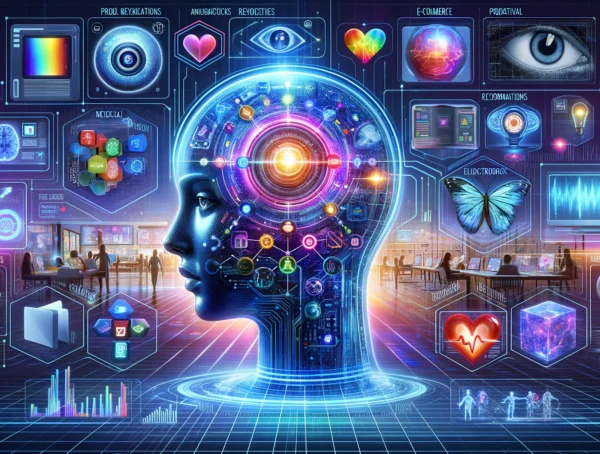Entering the vast, dynamic world of affiliate marketing can be a daunting endeavor for newcomers. However, with the advent of Artificial Intelligence (AI), new and promising avenues have emerged that are transforming the traditional landscape of this field. Affiliate marketing, an advertising model where a company compenses third parties to generate traffics or leads for their products, interweaves with AI to offer a more personalized, data-driven approach. This revolutionary combination unlocks potential for increased accurate product recommendation, advanced customer segmentation, and enhanced data analysis. The first step embarking on this journey requires a firm grasp on the core concepts of both affiliate marketing and AI, thus providing the necessary foundation to fully understand and exploit the benefits of AI in affiliate marketing.
Understanding Affiliate Marketing
Understanding Affiliate Marketing
Affiliate marketing is an online advertising strategy where a business rewards one or more affiliates (bloggers, influencers, etc.) for each visitor or customer brought in by the affiliate’s own marketing efforts. In simpler terms, if you promote a product or service and a purchase is made through your promotion link, you receive a commission from that sale.
How Affiliate Marketing Works
The affiliate marketing process involves four players: the merchant (also known as the ‘advertiser’ or ‘retailer’), the network (platforms connecting advertisers with publishers, handling tracking and payments), the affiliate (also known as the ‘publisher’), and the customer.
Merchants create affiliate programs and provide unique links for their products or services. Affiliates sign up for these programs and get a unique link to share. When a customer uses this affiliate link to make a purchase, the affiliate gets a commission. This purchase is traced via a cookie placed on the purchaser’s device when they click the affiliate link.
Different Affiliate Marketing Models
Affiliate marketing can be categorized into three models: pay-per-sale, pay-per-click and pay-per-lead.
In the pay-per-sale model, the merchant pays the affiliate a percentage of the sale price of the product after the consumer purchases the product as a result of the affiliate’s marketing efforts.
In the pay-per-click model, the merchant pays the affiliate based on the number of visitors redirected to the merchant’s website from the affiliate’s platform, regardless of whether the visitor makes a purchase or not.
In the pay-per-lead model, the merchant pays the affiliate based on the conversion of leads. This could be a filled out a contact form, signed up for a trial of a product, or subscribed to a newsletter.
The Role of Affiliate Marketer
The role of an affiliate marketer involves promoting a product or service by sharing it on a blog, social media platforms, or website. The affiliate uses advertising strategies to promote products and direct traffic to the target affiliate website.
When a prospective customer takes action, according to the affiliate’s marketing strategy, the affiliate earns a commission. The most successful affiliate marketers focus on niches that have high-profit margins and have high growth potential.
Earnings through Affiliate Marketing
Affiliate marketing earnings come from commissions. The commission that an affiliate gets can vary significantly. It can be anywhere between 5-50% or even more, depending on the nature of the product or service.
The affiliate’s earnings are directly proportional to how well the affiliate can convert traffic into sales. Therefore, it’s essential for an affiliate to have a good understanding of digital marketing, notably SEO, PPC, social media marketing, and content marketing.
Assuming you will become an affiliate marketer, it’s crucial to manage your expectations regarding earnings. Like any good business, it requires time, effort and commitment. But once you get the hang of it and understand what works best for you, the potential for earning a substantial income from affiliate marketing is very much real and achievable.

Basics of Artificial Intelligence (AI)
Understanding AI Basics
Artificial Intelligence (AI) is the branch of computer science that focuses on creating systems capable of learning, making decisions, and solving problems. AI can be classified into two main types: narrow AI, which is designed to perform a specific task such as voice recognition, and general AI, which can understand, learn, and apply knowledge across a broad array of tasks.
AI operates through specific algorithms, which are sets of rules or instructions followed by the AI to solve problems or complete tasks. Some of these algorithms lean towards machine learning, where the AI system can learn and improve from experience without being programmed explicitly.
Familiarizing with Machine Learning
Machine Learning (ML) is a primary subset of AI that allows systems to automatically learn and improve from experience. In essence, ML models are trained using large amounts of data and algorithms that allow them to learn how to carry out tasks. The more the data fed to these models, the more they can improve their predictions and outputs, which is one reason why data is paramount in AI.
Three common types of machine learning you might come across are Supervised Learning, where the AI is already provided with examples of correct answers; Unsupervised Learning, where the AI must figure out patterns in the data on its own; and Reinforcement Learning, where the AI learns through trial-and-error methods.
Applying AI and ML in Different Industries
AI and ML have found applications across various sectors due to their ability to automate routine tasks and provide useful insights from data. For example, in healthcare, AI can analyze patterns in health data to predict diseases. In retail, AI can help in identifying customer purchasing habits and recommending items based on their past purchases.
AI and ML in Affiliate Marketing
AI and ML are revolutionizing affiliate marketing by improving the efficiency and effectiveness of marketing campaigns. They can predict consumer behavior based on their previous online activities, helping marketers to target specific audiences better. AI and ML can also analyze campaign performance data to predict future trends and improve decision-making.
One of the many AI applications in affiliate marketing is using chatbots. They act as a customer representative that interacts with customers on websites, answering their queries and guiding them through the site. AI-powered chatbots can significantly improve the customer experience, leading to increased sales.
Another beneficial application of AI in affiliate marketing is in programmatic advertising. Here, AI algorithms buy and sell ad inventory in real-time to target ads accurately, ensuring that the right content reaches the right customers. Using ML algorithms, programmatic advertising platforms can analyze large amounts of data to determine which users are most likely to interact with a particular ad, thereby enhancing the overall effectiveness of an ad campaign.

AI in Affiliate Marketing
Understanding AI in Affiliate Marketing
Artificial Intelligence (AI) in affiliate marketing is used to optimize and personalize the affiliate marketing experiences. It leverages machine learning and predictive analytics to understand customer behavior and deliver tailored marketing campaigns. AI technology aids effective decision-making in affiliate marketing by analyzing data and suggesting actionable strategies.
Improving Product Recommendations through AI
AI plays a critical role in improving product recommendations in affiliate marketing. It analyzes visitors’ behavior, purchase history, and browsing patterns, then applies machine learning algorithms to offer customized product recommendations. These personalized suggestions help to capture visitor’s attention, increase conversion rates, and ultimately improve overall sales.
Personalization in Affiliate Marketing with AI
Personalization is a dominant trend in modern affiliate marketing, and AI helps to take it to the next level. AI algorithms can analyze customers’ purchase history, browsing behavior, and other data points to tailor content, offers, and experiences. It can customize emails, pop-ups, coupons, and deals to individual customers, making them feel valued and encouraging further purchases.
Customer Segmentation via AI
AI technology also aids in effective customer segmentation in affiliate marketing. Using machine learning, AI can classify customers into different segments based on their behaviors, preferences, and past purchases. This segmentation allows marketers to create targeted marketing campaigns, enhancing their chances of success. With AI, marketers can predict who will buy specific products, when they’ll buy, and how often they’ll make purchases.
AI for Precise Data Analysis
Analyzing a large amount of data accurately and quickly is a significant challenge in affiliate marketing. AI, however, makes this task easier. Machine learning algorithms identify patterns, trends, and insights from massive datasets in no time. AI-powered analysis can help affiliates and marketers make informed decisions about their marketing strategies. For example, based on the data analyzed, marketers can determine which affiliate programs are generating more revenue and which are underperforming.
In conclusion, AI’s integration into affiliate marketing can lead to smarter and more effective strategies. It enables personalization, enhanced user experience, precise customer segmentation, and accurate data analysis, all contributing to the success of affiliate marketing efforts.

Practical Application and Tools
Understanding AI in Affiliate Marketing
As a beginner in affiliate marketing, the first thing you need to grasp is what AI (Artificial Intelligence) is. Artificial Intelligence refers to the simulation of human intelligence processes by machines, especially computer systems. It involves learning (the acquisition of information and rules for using information), reasoning (using rules to reach approximate or definite conclusions), and self-correction. AI is a pivotal tool for optimizing and personalizing customer experience in affiliate marketing.
Practical Application of AI in Affiliate Marketing
AI can be a game-changer in affiliate marketing, enhancing the effectiveness of your strategies. A common application of AI in affiliate marketing is data analysis. AI algorithms use collected information to understand customer behavior and provide insights for targeted marketing campaigns. For instance, AI can analyze a customer’s previous buying behavior to suggest related products or services they may be interested in.
Another example of AI application is in content generation. AI-powered tools can automatically create engaging content that fits your brand tone and style, providing creative and relevant content to your affiliate network on a consistent basis. AI tools also help in programmatic advertising. These algorithms can bid on ad space in real-time, allowing for the most effective use of your advertising budget.
Evaluating the Market: AI Software and Tools
There are numerous AI tools used in affiliate marketing. When evaluating the right tool for you, consider factors like the features it offers, ease of use, customer support, and pricing structure. Among popular AI tools in affiliate marketing are Google Analytics (for tracking and reporting), Grammarly (for AI-generated content), and Outbrain (for using AI in programmatic advertising). Consider experimenting with different tools to determine which works best for you.
Measuring Success of AI-Based Affiliate Marketing
To gauge the success of your AI-based affiliate marketing, set Key Performance Indicators (KPIs) that align with your marketing goals. They could include an increase in conversion rate, improvement in customer engagement, or rise in revenue generated. Use AI-powered analytics tools to track these metrics and understand whether your strategies are working or need adjustments.
In conclusion, applying AI in affiliate marketing isn’t just about implementing the latest technology. It’s about leveraging this technology to understand and enrich the customer journey, ultimately leading to better conversion and customer retention rates.

The versatility of AI in affiliate marketing is undeniable. Its capabilities in enhancing personalization, aiding in customer segmentation, and improving product recommendation have edged this marketing strategy ahead in the competitive digital space. Nevertheless, adopting AI in affiliate marketing is not a one-size-fits-all solution and the practical application of AI tools requires astute evaluation of different software and tools, each with their unique strengths and weaknesses. In the wake of rapid technological advances, the ability to adeptly wield these tools and interpret their results marks a successful affiliate marketer. Always remember, the application of AI in your marketing approach can only be as good as your understanding of both AI and affiliate marketing fundamentals.
More from Blog
Artificial Intelligence: Introducing Its Basic in a Nutshell
What is artificial intelligence?A primer on AI, its definition, and its significance.Artificial intelligence (AI) is a branch of computer science …
Skyrocket Affiliate Outreach With AI – Scale Your Biz Now
As the digital landscape evolves, businesses must adapt to remain competitive and foster growth. One aspect that is seeing significant …
AI Discovery Journey: Exploring The World of Artificial Intelligence
Introduction to Generative AIArtificial Intelligence has rapidly transformed from science fiction to a central part of our technological reality. Among …
AI Image Generation: The Ultimate Guide to Creating Stunning AI Art [2024]
AI image generation has revolutionized how we create visual content. In this comprehensive guide, we'll explore Envato's AI ImageGen tool, …
Discover GPT-40 Vision: The Future of AI Innovation
Artificial intelligence is evolving rapidly. OpenAI's latest innovation, GPT-40 Vision, aims to revolutionize our interaction with technology. This AI model …
AI Discovery Journey GPT: How to Effortlessly Explore It?
IntroductionThe "AI Discovery Journey GPT" is an exceptional tool that caters to a wide range of users, from beginners to …
















